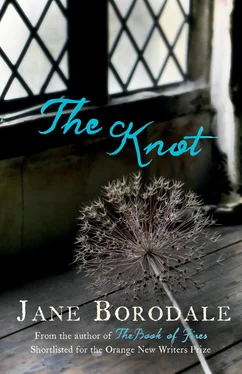1 ...8 9 10 12 13 14 ...19 He wants Frances to laugh then, and get up from her chair and go to him to soothe his troubled feelings and gather him into her fine encircling arms, and suggest an early retirement to bed for the night, but she does not; she is playing at being the dutiful wife. Instead he watches her bite a length of her thread from the reel and hold the needle close to her face to see its narrow impossible eye in the candlelight. He feels desire kindling in him as she puts the end of the thread in her mouth and makes it firm and damp between her lips, and then the thread is through. Henry looks despondently at the interminable hem she is stitching along, and knows there will be no consolation to be had from her tonight. It is not that she is shy, or reticent about her new role as a wife, and she even listens to him as she works, something it must be admitted that Anys did not always do. But he is finding that her poise and coolness disconcert him on a daily basis.
She has very good teeth, he thinks, looking into the fire, at least he has that to be grateful for.
1566
Chapter VII.
Of SHEPHEARDS PURSE. It hath sound, tough and pliable branches, of a fote long, with long leaves, deeply cut or jagged. The floures are white, in place whereof when they are gone, there riseth small flat cods, or triangled pouches, wherein the seede is contained.
CHRISTMAS AND TWELFTH NIGHT have been and gone, but scraps of ivy and mistletoe are still up in the hall. They drive Henry mad, everywhere he treads, little, limp leaves beneath his feet, but it’s been a pleasure to have a reason to open up a vat of Gascon wine, and make spiced hot hippocras by the fireside, share it out on those cold, stark nights. They all survived the tenants’ feast and there were no disagreements. The girls enjoyed the juggler that came on Boxing Day and Old Hannah surpassed herself with tarts, roast meats and suckets, though Frances didn’t seem to enjoy the Christmastide victuals as much as he did. He hopes she is not sickening for something, as wintertime is not ideal for having doctor’s visits in the night, the roads can be treacherous.
No word though from his father during this time, which is a source of great sadness to him. He had sent a fat goose over to Sherborne, but received no word in return. He always misses his mother at Christmas, and he observes the girls and knows how much they must miss theirs, too, though they never complain. Anys loved games at Christmas. Of course after she died Mary in particular was inconsolable, crying for hours on end, clinging onto her poppet. Florence was just a newborn. Jane did not speak. Edith, the eldest, bustled about the younger ones, in fact he hardly saw her, but even she has a look in her eye still that he finds hard to describe, except that it is like a dullness, as though some essence in her had died away.
The memory of his own mother Edith is now so eclipsed by the disagreeable nature of his relationship with his father’s second wife Joan Young that Edith Lyte appears only occasionally as a kind of improbable saint in his imagination. Sometimes he dreams of her as a white, cloudy horse leaping over his head, and the leaps are like steam pouring through air. In these dreams his horse-mother never lands, is always vaulting the hedges, legs stretched mid-jump, so that he sees the underbelly, the pale unshod hoofs. In the dreams he does not know if she can see him standing there below her, his small boy’s face tilted up to the dark sky, studded with stars. Sometimes he knows her view of him would be obscured by trees even if she should look down, he netted in shadow, rooted in shadow, his leather boots sunk an inch into mud on the track so that he cannot move from the lea of the withy hedge, its overhang.
His father is becoming a stranger to him. In the last few months they have exchanged cursory messages about land matters, church dues, administration, crops and tenancies, but not a word between them about family life, no ordinary pleasantries. He has never asked after Henry’s new wife’s health, and never refers to her by name, in fact Henry is not sure he has ever mentioned her at all. He has many feelings about all of this, most of which he pushes to one side and declines to think on. But when he receives word to expect his father on Tuesday next he has no choice but to recognize the state of things between his father and himself.
It has to be said, he is not sure of his motives for coming. John Lyte’s health is not good and the ride over from Sherborne may not be comfortable for him, but according to the short letter he has sent, he insists on coming to discuss the proposed sale of various cows while prices are strong. Henry knows that he wants to check on the estate, make sure that Lytes Cary is not suffering in his son’s hands. In turn, Henry is looking forward to imparting good news about the ditches, which have been cleared already, and have him savour last season’s cider, which is exceptional. Henry always strives to please his father: this time it seems vital, and as a small chink of light falls onto that ignored, closed corner of his life which his father occupies, he begins to wonder. He wishes … oh, it is no matter what he wishes. No doubt it will all die down or be smoothed over and forgotten before long. The childish dependent part of him hopes the visit is a reconciliatory one, in which his father plans to apologize for not attending the wedding.
At the same time he resents the way this makes him feel. He wants it all to go away and leave him to get on with the real project in his mind; his garden, his pride. He wants to talk of it with his father but something prevents him, and he thinks they will not walk around to that side of the house to show off the new walls and ironwork and open beds. Though every other ounce of him cries out to try to impress his father, he would prefer to wait until the garden has found its balance, until its own presence has become distinct. He does not want his father’s disapproval spoiling his enthusiasm, and most of all he does not want Joan Young prying into the cost and workings of it all, criticizing his choice of rose, his taste, his usefulness, his ambitions.
Indeed he is hoping that Joan will stay behind, because her presence in the house makes the servants behave erratically in front of his father, which makes it seem as if he cannot properly restrain his household. At least that is what occurred on the last occasion that she came, over a year ago. It had been unfortunate, for example, that a large, black fly the size and furriness of a bumble bee had drowned itself in her glass and bobbed unnoticed all the way from the kitchen to her place at table.
In his reply to his father’s letter he had not extended a courteous wish to see his stepmother. For several nights he lies in bed at night agonizing over whether he might be making a mistake by not inviting her, and then again, is he making one if he does?
All this browbeating proves to be a waste of time, because even as he spies the newfangled, painted carriage that she insisted that his father purchase lurching up the drive, he can see from the dark, malevolent shape wrapped beside him that they will not be left alone together, that she has come. It is St Vincent’s day; the patron saint of drunkards, he thinks wryly, and as they approach he steels himself for the abomination of her company, summons the cheerful greeting he has rehearsed.
‘Father!’ he calls up, but he can see the discomfort all over his face already. His hand raises stiffly in the air, more like a warding-off than a greeting.
When he descends they embrace briefly, but then his gaze looks everywhere but at Henry. Blackie runs round the horses, barking, providing distraction.
‘Madam,’ he bows to his stepmother.
Their distaste for each other is entirely mutual. When she smiles her ghastly wooden teeth at him, it is more as if she was grinding them together. A very fast, small woman, she clambers unaided from the carriage and beetles straight across the porch threshold and disappears into the passage towards the kitchens, her sleeves trailing. No one has worn sleeves like that for twenty years. Dressed in cloth of that inky purple hue, and with her nose turned blue at the tip from the breeze on the ride, she has always looked to him like death on legs; cadaverously alive. He had detested her manner from the moment she entered their lives when he was younger; she would coil herself around his father like she owned him, in an offensive way his mother would never have wished or dared to do. In his blackest, most resentful moments, he has thought of her like rootless Devil’s Thread, wrapping its strands about the crop plants in the fields, strangling all hospitable life from them. Now though he knows to call her parasite would be disrespectful to his father. She is kin.
Читать дальше












